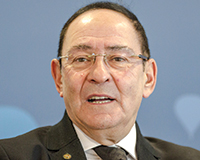Manchester’s renaissance could stall unless the city finds the right candidate to replace outgoing chief executive Sir Howard Bernstein, the property industry warned this week.
The starting pistol was fired on the race to succeed Bernstein on 15 September after he confirmed he would retire in spring 2017. It is one of the biggest jobs in local government and perhaps the most important to the property industry.
However, a successor will face very different problems to those faced by Bernstein, who took over when it was a struggle to attract people and investment into the city centre.
Manchester has attracted £8.2bn of investment in the past 10 years, more than any regional city. That included £1.4bn last year, according to Bilfinger GVA; one third of which was from overseas investors.
Huge schemes that are likely to arrive on his successors’ desk include St John’s, Airport City, the Northern Gateway and ensuring the HS2 continues amid uncertainty over its budget and new governmental priorities.
While top of the list will be the location for the HS2 station, much of the other large-scale planning, as one developer put it, “has been done, now it is infill”.

Instead the next chief executive will need to focus on an increasingly unaffordable residential market, ensuring infrastructure is sufficient to allow the city to grow, and that the office market continues to attract global tenants following the UK’s decision to leave the EU.
Bernstein, dubbed a “property developer disguised as a town clerk”, is widely regarded as the man who positioned Manchester as the UK’s darling of inward investment outside London.
An advocate of public-private partnerships, his track record includes regeneration projects such as Hermes and the Co-Operative Group’s NOMA, Allied London’s Spinningfields, and the future regeneration of Piccadilly around the planned HS2 station.
“Sir Howard will undoubtedly go down in history for repositioning and transforming Manchester into a truly global destination for investment and restoring Mancunian pride in the city,” said Ken Knott, chief development officer of Select Property Group. “His partnership with Sir Richard Leese has been one of this and last century’s greatest civic leadership success stories and the loyalty of his team is testament to this.”
He has also been at the forefront of negotiations with Whitehall, playing a key role in negotiating devolved powers for the Greater Manchester region.
The industry is keen to see his legacy of promoting private-sector partnerships continued. The council will convene shortly to begin the process of recruiting a new chief executive.
Bernstein’s departure next year will come around the same time as the election of the first Greater Manchester mayor, who will take over authority on many key projects Bernstein has overseen.
Some members of the local property industry have questioned whether the Labour mayoral candidate, Andy Burnham, will take a pro-development stance, after he pledged to divert the region’s £300m housing fund away from investors looking to build “luxury developments”.
The future of the Northern Powerhouse also hangs in the balance as prime minister Theresa May has signalled a shift towards an “industrial strategy” that prioritises skills and infrastructure investment more evenly around the country.
• To send feedback, e-mail Louisa.Clarence-Smith@estatesgazette.com or tweet @LouisaClarence or @estatesgazette











